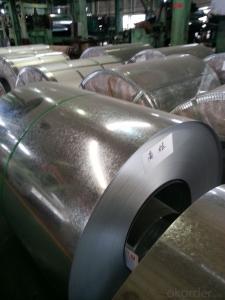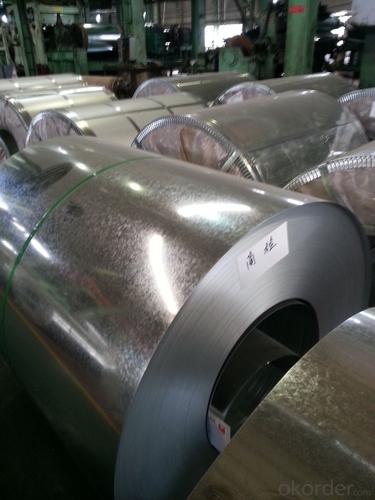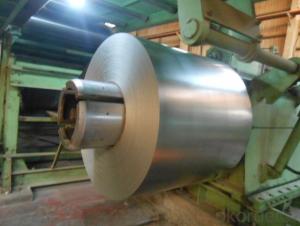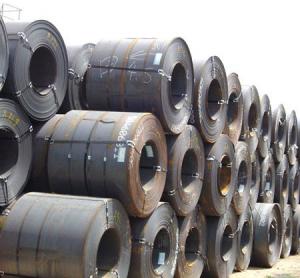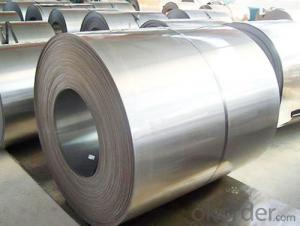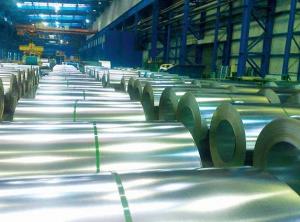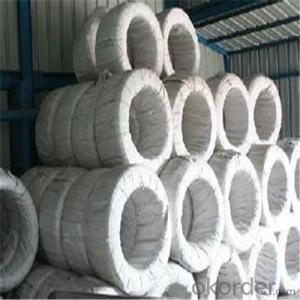Hot Dip Galvanized Steel Coil in coil
- Loading Port:
- Shanghai
- Payment Terms:
- TT OR LC
- Min Order Qty:
- 50 m.t.
- Supply Capability:
- 5000 m.t./month
OKorder Service Pledge
OKorder Financial Service
You Might Also Like
Hot Dip Galvanized Steel Coil
Steel Grade & Standard:JIS G3302 SGHC
Zinc Coating Mass:Z12
Spangle:Regular Spangle
Surface Treatment:Chromated,Unoiled,NonSkinpassed
Coil ID:610mm
Coil Weight:4-7MT
Package Type:
Thickness Tolerance: 0.02mm
Width Tolerance:0-5mm
Zinc Coating Tolerance:2um
Thickness:0.5-3.7mm
Width:914mm-1250mm
Application
1. Architecture Roofs and outside walls of civilian and industrial buildings, garage doors, fencings and window blinds
2. Appliances Industry Outer clad sheets for washing machine, refrigerator, television, air conditioner and ventilation system, explosion-proof strip, solar water heater and appliance parts
3. Auto Industry Muffler, heat shields of exhaust pipe and catalytic converter, auto parts & accessories under the frame, signboard in highway
4. Industrial Instruments Electric control cabinet, industrial refrigeration equipment, automatic vending machine
- Q: What is a steel coil?
- A steel coil is a long, continuous strip of flat-rolled steel that is wound into a coil shape. It is typically used in various industries, such as automotive, construction, and manufacturing, for making a wide range of products, including pipes, tubing, roofing, appliances, and automotive parts.
- Q: How are steel coils inspected for impact resistance using impact testers?
- Steel coils are inspected for impact resistance using impact testers by subjecting them to controlled impacts of varying force and measuring the resulting deformation or damage. The testers typically consist of a pendulum or a falling weight that strikes the surface of the coil, simulating real-life impacts. The force and velocity of the impact can be adjusted as per the testing requirements. The extent of deformation or damage is then visually assessed or measured using specialized equipment, providing valuable information about the coil's ability to withstand impacts and potential performance in real-world applications.
- Q: What are the main applications of steel coils?
- The main applications of steel coils include manufacturing of automobiles, construction materials, appliances, furniture, and packaging materials. They are also used in various industries such as oil and gas, aerospace, and shipbuilding.
- Q: How do steel coils contribute to durability and longevity in products?
- Steel coils contribute to durability and longevity in products due to their inherent strength and resistance to corrosion. By using steel coils as a material, products benefit from enhanced structural integrity and the ability to withstand heavy loads, mechanical stress, and harsh environmental conditions. The flexibility and resilience of steel coils also ensure that products can maintain their shape and functionality over a prolonged period, making them highly durable and long-lasting.
- Q: What are the common methods of recoiling steel coils?
- The common methods of recoiling steel coils include slitting, rewinding, oscillating, and recoiling using a mandrel or a recoiler machine. Slitting involves cutting the wide coil into smaller widths, while rewinding involves rewinding the coil into a tighter, more compact roll. Oscillating is a method where the coil is wound back and forth to create a narrow, oscillating coil. Finally, recoiling using a mandrel or a recoiler machine involves winding the coil onto a mandrel or a spool to create a new coil of desired size and shape.
- Q: Got small (.177) bb gun for fun with my son...From the manual:'Steel shot will fire at a higher velocity then lead shot with with the same muzzle energy. As a result, more caution is required when using steel shot because of a greater hazard of ricochet. Lead, because of its lower velocity, usually has less penetrating power and is less likely to ricochet.'Are you agree with that? ;)
- steel is made of iron mainly (and carbon) its density is 7.86 g/cm? approximately. and lead has density=11.4 g/cm?. so, if have same volume and shape steel will have less mass and thus will have greater velocity for same muzzle energy. I agree the manual. for more information on ricochet
- Q: Can steel coils be bent or shaped?
- Yes, steel coils can be bent or shaped. Steel coils are flexible and can be easily manipulated into various forms or shapes through processes like bending, rolling, or stamping.
- Q: What are the different methods of steel coil surface cleaning?
- There are several methods of steel coil surface cleaning, including mechanical cleaning, chemical cleaning, and high-pressure water cleaning. Mechanical cleaning involves using abrasive materials or brushes to physically remove dirt, rust, and other contaminants from the surface. Chemical cleaning uses various chemicals or solvents to dissolve or loosen the contaminants, making them easier to remove. High-pressure water cleaning involves spraying water at a high pressure to dislodge and wash away the dirt and debris. These methods can be used individually or in combination, depending on the level of cleanliness required and the specific condition of the steel coil.
- Q: is surgical steel or sterling silver belly button rings better for you? surgical is really cheap so its sketch and i justt dont want it to mess up
- Sterling Silver Belly Rings
- Q: I've heard different things bout them, though I do not know this. Oh, and if you know where you can buy some raw or get custom made stuff out of black steel please let me know it would be greatly appreciated. Oh and my friend told me there is a black steel that can be sharpened and silver will be underneath, is this also true? Thank you very much for answering ^^
- Black steel is steel with a surface layer of dark coloured iron oxides used for low pressure hot water heating pipes. Black iron is iron without any finish on it, which is really gray-black in color. they may be the same as many people often confuse iron and steel. Since the steel is simply steel with a covering, it could describe any steel including your silver steel.
Send your message to us
Hot Dip Galvanized Steel Coil in coil
- Loading Port:
- Shanghai
- Payment Terms:
- TT OR LC
- Min Order Qty:
- 50 m.t.
- Supply Capability:
- 5000 m.t./month
OKorder Service Pledge
OKorder Financial Service
Similar products
Hot products
Hot Searches
Related keywords
